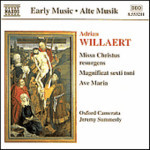
Missa Christus Resurgens / Magnificat Sexti Toni
 $25.00
Out of Stock
$25.00
Out of Stock6+ weeks add to cart
WILLAERT
Missa Christus Resurgens / Magnificat Sexti Toni
Oxford Camerata / Jeremy Summerly
[ Naxos Early Music / CD ]
Release Date: Saturday 10 May 2008
This item is currently out of stock. It may take 6 or more weeks to obtain from when you place your order as this is a specialist product.
Of all composers of the first half of the sixteenth century, Adrian Willaert is perhaps the most appreciated by contemporary composers and theorists such as Zarlino and Danckerts.
Occupying for 35 years one of the central positions in the musical life of Northern Italy, that of maestro di cappella at St Mark's, Venice, Willaert made significant contributions to the development of vocal music both sacred and secular. Not only that, but he was a renowned theorist and teacher, numbering many of the most important figures of the time - including Cipriano de Rore and Andrea Gabrieli - amongst his pupils.
Neither Willaert's date nor place of birth is known for certain, though the latter is claimed by contemporary writers as both Bruges and Roulaers. The date can be inferred from the fact that he was by 1515 a singer in the service of Cardinal Ippolito I d'Este, brother of the Duke of Ferrara, Alfonso d'Este. He left the d'Este family only in 1527 when he was appointed to St Mark's. Willaert's pupil and greatest enthusiast Zarlino credited him with the invention during his years at St Mark's of the famous cori spezzati technique of double- (and later poly-) choral writing. The discovery by modern scholars of examples from earlier in the sixteenth century has shown this claim to be inaccurate, but it is undeniably the case that Willaert's double-choir psalm settings (some written in collaboration with Jacquet of Mantua) are seminal to the style. In addition to his contemporary pre-eminence in sacred music, Willaert was simultaneously at the forefront of developments in the emerging secular form of the madrigal. This is not the place for a discussion of developments in secular music; Alfred Einstein's opinion, expressed in his pioneering 1949 study The Italian Madrigal will suffice.
Tracks:
Christus resurgens (Richafort)
Missa Christus resurgens
Magnificat sexti toni
Ave Maria
